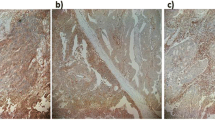Abstract
Lymphocyte homing receptor (CD44) is involved in lymphocyte adhesion to endothelial cells of high endothelial venules (HEVs) and lymphocyte exit from the blood circulation, and it may be involved also in hematogenous dissemination of malignant lymphoma. Prognostic significance of lymphocyte homing receptor expression defined by Hermes-3 antibody was studied among 27 gastrointestinal lymphomas followed up for 8 to 20 years after the diagnosis. Lymphomas lacking or with very weak homing receptor expression (n = 14, 52%) were associated with 57% 10-year survival rate as compared with only 15% among lymphomas that expressed CD44 more strongly (P = 0.02). We conclude that lack of lymphocyte homing receptor expression is common in gastrointestinal lymphoma, and that CD44 expression is associated with unfavourable prognosis.
Similar content being viewed by others
Author information
Authors and Affiliations
Rights and permissions
About this article
Cite this article
Joensuu, H., Ristamäki, R., Klemi, P. et al. Lymphocyte homing receptor (CD44) expression is associated with poor prognosis in gastrointestinal lymphoma. Br J Cancer 68, 428–432 (1993). https://doi.org/10.1038/bjc.1993.354
Issue Date:
DOI: https://doi.org/10.1038/bjc.1993.354
- Springer Nature Limited
This article is cited by
-
Inhibition of cyclooxygenase-2 suppresses invasiveness of oral squamous cell carcinoma cell lines via down-regulation of matrix metalloproteinase-2 and CD44
Clinical & Experimental Metastasis (2005)
-
Detachment of transformed cells
Cell Biophysics (1995)




